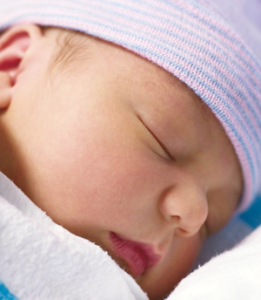Breastfeeding Tips for Your Hospital Stay
Establishing breastfeeding while you’re in the hospital makes a big difference in your breastfeeding success (differently defined by each mom). Your choices, responsibilities and ability to communicate your wishes will make you more prepared and confident for those first few days following your infant’s birth. Here are suggestions for maximizing your breastfeeding experience before and during your hospital stay:
1) Talk with friends, family and coworkers about their experiences with establishing breastfeeding in the hospital. This will help you uncover trends and might give you specifics as to what to request or do differently.
2) Talk with the nurse manager of labor and delivery about arranging for your baby to be breastfed in the first hour after birth. By law, some procedures must be done in the first hour of birth but others – like the first official bath – can wait until after your first nursing session. Share copies of your written breast-feeding wishes with ALL of your labor and delivery nurses and request that sugar water, formula or a pacifier NOT be given to your newborn unless medically necessary. This will make early breastfeeding efforts much easier.
3) Page the lactation staff so they are aware of your desire to breastfeed right after delivery. It will make it easier and increase your confidence to have a lactation professional with your for the first nursing. Ask about rooming-in and the skin-to-skin technique. Ask for a lactation consultant to make another room visit in order to observe your technique before you are discharged. Get her contact information in case any questions come up at home.
Keep in mind that even though breastfeeding is natural, it will make it much easier on you if you have support and guidance in place from the beginning!
Julie Hamilton, is a certified lactation consultant and breast-feeding advocate.
He’s Here! and There’s Lots to Do: What to Expect After the Delivery
You’ve gone through labor and delivery and you’ve even held your infant for a moment … but the nurse needs to take him away … what for?
- Foot prints (and sometimes finger prints) are taken
- He’ll be bathed and put in a warmer
- His umbilical cord stump will be cleaned and treated
- He’ll undergo a hearing test
- He’ll be pricked on the heel to be tested for diseases including PKU (inability to digest protein), galactosemia (inability to digest milk sugar properly), hypothyroidism (defect in thyroid gland), hemoglobinopathy (red blood cell diseases) and adrenal hyperplasia (defect in adrenal gland)
- He’ll be visited regularly by his pediatrician for checkups
- He may be circumcised, if you desire. This is usually performed by your OB/GYN. Ask your doctor if he uses a local anesthetic. Your doctor will not perform this procedure without written consent from you.
- In between all of this and in between feedings, he’ll be diapered, swaddled and brought back to you or kept in the nursery so you can sleep!
Source: American Academy of Pediatrics
 Curl Up with a Book …
Curl Up with a Book …
Just can’t get your hand on enough info for you and Baby? Here are great new titles to enjoy:
Welcoming Home Baby the Handcrafted Way (Sellers $18.95) by Tricia Drake offers lovely (and quick!) ways to create wraps, cocoons and hats for your little one. Beautiful photographs will inspire
Shake those rattles and start smiling, you’re about to be a shutterbug. Try Your Baby in Pictures: The New Parent’s Guide to Photographing Your Baby’s First Year (Amphoto Books; $19.99) by Me Ra Koh, professional photographer. Included are great tips and ways to make getting fantastic shots easy
Strike a pose with Baby with Yoga for Mothers and Baby: Interactive Poses for You and Your Baby 0 – 3 (Cico; $19.95) by Francoise Barbira Freedman. Simple and effective stretches will help you both feel great while developing your special bond
A special keepsake for Grandma’s sweetie is found in Memories for My Grandchild: A Grandmother’s Keepsake Journal (Welcome Books; $22.50). Preserve family stories, photos and mementos in this wonderful book that the grandkids will fight over!
Baby’s Health: Tip Sheet
 Food Allergy & First Borns
Food Allergy & First Borns
A new Japanese study shows that first-born children are more apt to have food allergies than second or subsequent children. Researchers compared 13,000 kids between the ages of 7 and 15 by looking at the allergy rates and where each child fell in terms of birth order. The findings were presented in March, 2011 at the annual meeting of the American Academy of Allergy, Asthma and Immunology.
No Thanks to Bad Advice
New moms are bombarded with questionable parenting advice – and especially from mom-in-laws – a new netmums.com survey suggests. Two in five of 4,000 mothers surveyed said a relative gave advice that could harm their baby’s health. Best advice? Do your own research!
Baby Bottom Blues
Rash may develop on Baby’s bottom from sitting too long in a soiled diaper, but there are other triggers, too, according to the National Institutes of Health. These include: frequent bowel movements or diarrhea; use of an antibiotic; irritation caused by ammonia (a by-product of urine); wearing ill-fitting diapers; and a reaction to detergent (for cloth diapers).
Breastfeeding’s Smart
According to researchers from the University of Durham in the United Kingdom, longer periods of breastfeeding are associated with larger brain growth. The findings support the World Health Organization’s recommendation that babies should be breastfed exclusively for the first six months of life, followed by continued breastfeeding (along with other foods) up to age 2 or longer.





